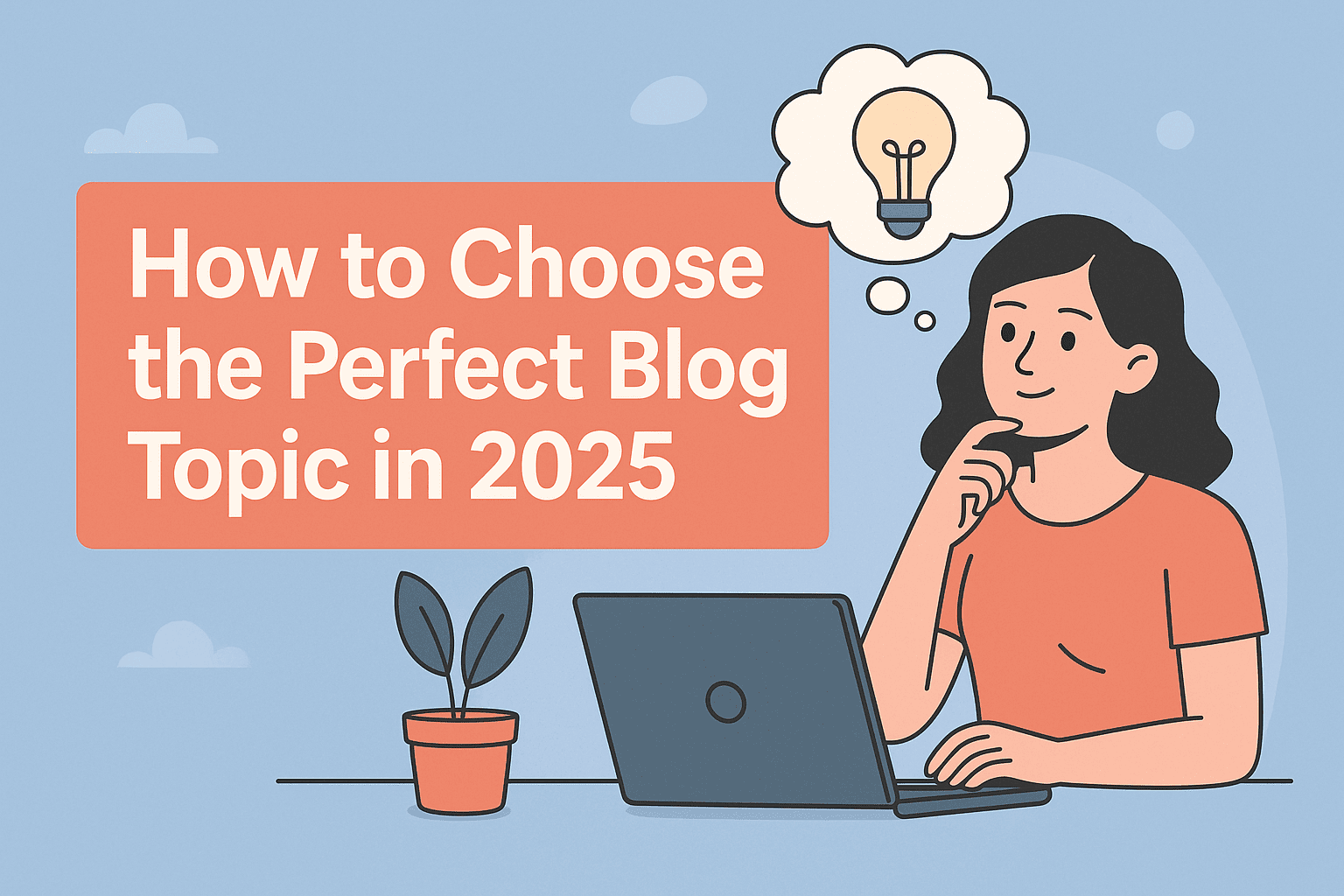Blogging has been a transformative journey for me, evolving from a simple online activity into a powerful platform for sharing ideas, building communities, and even creating opportunities for growth. In my previous post, “How I Started Blogging in 2016 and Turned From Hobby to Passion Project”, I shared my personal story of discovering the potential of blogging and how it became such an integral part of my life. Just yesterday, I followed up with “What You Need to Start a Blog Website in 2025?”, where I broke down the essential tools and strategies for anyone looking to begin their own blogging journey.
However, one question I often hear from aspiring bloggers is, “How do I choose the right topic for my blog?” This can feel like an overwhelming decision, but I’ve learned that selecting a topic that aligns with your passion and resonates with an audience is the key to building a blog that stands out.
In this post, I’ll share my personal insights and strategies for finding the perfect blog topic in 2025. Whether you’re just starting or thinking of narrowing your focus, I’ll guide you through practical steps to help you make this crucial decision and set your blog up for success.
Why Choosing the Right Blog Topic Matters
When I first started blogging, I didn’t realize how important it was to choose the right topic. At the time, I simply wrote about what interested me, without much thought about who might read it or whether it had long-term potential. Looking back, I see how much of an impact that decision can have.
The topic you choose shapes everything about your blog—from the kind of audience you attract to the way you monetize your content. If you pick a topic you’re not truly passionate about, it can be hard to stay consistent, especially when life gets busy. On the other hand, if you choose a topic that no one is searching for, it might be difficult to build an audience, no matter how great your content is.
In today’s competitive blogging landscape, especially in 2025, understanding the intersection of your interests, audience demand, and market potential is more critical than ever. Platforms like Google Discover prioritize niche-specific, high-quality content, and Google AdSense rewards blogs that attract targeted, engaged readers. A well-chosen topic allows you to stand out, build authority, and create a sustainable foundation for your blog.
In the sections that follow, I’ll share how I’ve approached this decision and what I’ve learned from both successes and mistakes in choosing blog topics.
What Are You Passionate About?
When I started thinking about my first blog, I didn’t realize how much my personal interests would influence its longevity. I’ve found that writing about something you’re genuinely passionate about makes the process enjoyable, even during challenging times. Your enthusiasm will naturally reflect in your writing, making it more engaging for readers.
If you’re struggling to identify your passion, here’s an exercise that worked for me:
- Ask yourself, “What topics excite me so much that I could talk about them for hours?”
- Reflect on your hobbies, skills, or even the challenges you’ve overcome.
- Think about the questions friends and family often ask you for advice on.
For example, one of my earliest blog niches came from my love for technology and writing. Over time, I realized that my enthusiasm for explaining complex ideas in simple terms resonated with a broader audience. This blend of passion and utility made blogging feel less like work and more like a creative outlet.
To help you get started, here are some evergreen and trending blog niches for 2025:
- Sustainable Living: Zero-waste tips, eco-friendly products, and lifestyle changes.
- Tech and AI: Tutorials, product reviews, and discussions about the latest advancements.
- Health and Wellness: Mental health, fitness journeys, or nutritious recipes.
- Creative Hobbies: DIY projects, photography, or digital art.
- Personal Finance: Budgeting, investing, or side hustles.
Remember, it’s okay to start broad if you’re not sure. I began with general topics and gradually refined my focus as I learned more about what I loved writing about and what resonated with my audience.
Next, let’s talk about researching your audience and market trends—something I wish I had done earlier in my blogging journey!
Researching Your Audience and Market Trends
Now that you have some idea of your passions, it’s time to look at what your audience wants and what’s trending in the market. This step is crucial because passion alone won’t guarantee traffic; you need to make sure your blog resonates with the people you want to reach.
One of the best ways to start is by using tools like Google Trends, AnswerThePublic, and SEMrush. These platforms can give you a glimpse into the questions people are asking and the topics that are generating buzz right now. They’ll help you spot emerging trends, so you can write about what people are actively searching for. This is where the magic of balancing passion with profitability happens.

Take some time to research what your ideal readers care about. What are their struggles? What questions keep them up at night? This can be a huge clue in finding your niche. For example, if you’re passionate about eco-friendly living, you might discover that there’s a growing interest in “zero-waste cooking” or “sustainable fashion.” These sub-niches have the advantage of being specific and engaging while still tapping into broader sustainability trends.
But it’s not all about trends. You also need to understand your competition. Use tools like SEMrhttps://www.semrush.com/ush to analyze what’s already out there. Who are the big players in your niche? What’s working for them? This can help you refine your own content strategy and carve out a unique angle that will set you apart.
And don’t forget social media! Browse through discussions on Twitter, Reddit, or Facebook groups to see what real people are talking about. The feedback you get can help you understand the needs and desires of your target audience better than anything else.
By doing thorough research, you’ll uncover opportunities to fill a demand-supply gap. That’s where the real growth happens.
SEO in Choosing a Blog Topic
Now that you’ve identified your niche and researched your audience, let’s dive into one of the most important aspects of blogging—SEO (Search Engine Optimization). SEO is the secret sauce that helps your blog get discovered by search engines like Google. Without it, even the best content can get lost in the vast sea of the internet. So, understanding how SEO works is key to picking a blog topic that’s not only relevant to your audience but also searchable.
When choosing a blog topic, start with keyword research. Keywords are the specific words and phrases people type into Google when they’re looking for information. If you can target keywords with a good balance of search volume (how many people are searching for it) and low competition (how hard it is to rank for), you’ll set yourself up for success. For instance, a term like “healthy recipes” might be highly competitive, while something more specific like “easy gluten-free lunch ideas” could have less competition and a more targeted audience.

One way to find these golden keywords is by using free tools like Ubersuggest or Google Keyword Planner. They can show you search volumes, competition levels, and related keyword ideas. I recommend focusing on long-tail keywords, which are longer, more specific phrases that typically have lower competition but can lead to highly targeted traffic. For example, instead of writing about “fitness,” you might choose something like “home workouts for beginners without equipment.”
It’s also important to align your blog topic with search intent—in other words, what are people really trying to achieve when they search for certain keywords? Are they looking for information, products, services, or answers to questions? Understanding this helps you tailor your content to meet their needs, which increases your chances of ranking higher on search engines.
SEO isn’t just about keywords—it’s about building a site that’s easy to navigate and creating high-quality content that answers your audience’s questions. So, when choosing a blog topic, think about how you can incorporate these SEO principles from the start. It’ll help you reach your audience and grow your blog in the long run!
Evaluate Monetization Potential
Once you’ve nailed down a blog topic that you’re passionate about and optimized for SEO, it’s time to think about how you can monetize your efforts. After all, turning your blog into a revenue-generating platform is likely one of your goals, right? The good news is, certain topics have much more potential for monetization than others. But how do you know if your chosen niche is profitable? Let’s break it down.
First, consider the most common monetization methods available to bloggers: ads, affiliate marketing, sponsored content, and even selling your own products or services. For example, if you choose a topic like “personal finance for millennials,” you could monetize through affiliate links to credit cards, investment tools, or budgeting apps. On the other hand, if you’re blogging about a more niche topic like “minimalist travel gear,” you might focus on affiliate partnerships with travel brands or sponsored content from travel-related companies.
A great way to gauge whether a niche has monetization potential is by looking at CPC (Cost Per Click) rates for AdSense or similar ad platforms. If certain keywords in your niche have high CPC rates, it means advertisers are willing to pay more for ad space related to that topic. This can be a signal that your niche is profitable, especially if you plan to generate income through display ads.
Additionally, it’s wise to research profitable niches for 2025. For example, niches related to remote work tools, AI-driven solutions, or mental health and wellness are expected to see growth. These topics not only tap into growing trends but also have a broad range of monetization opportunities, from selling digital products to partnering with companies in those industries.
In short, take the time to assess whether your blog topic can support various monetization strategies. It’s always a good idea to think long-term about how you can diversify your income streams and make your blog a sustainable business.
Testing Your Blog Topic Before Committing
Before you fully dive into your blog topic, it’s essential to test the waters. You might be passionate about a particular subject, but how can you be sure it will resonate with your audience and attract the traffic you’re hoping for? Testing your blog topic is the smart way to minimize risk and maximize your chances of success.
Start by creating a few sample posts around your chosen topic. Think of this as your pilot content. Write posts that answer common questions, solve problems, or provide valuable insights related to your niche. Once your content is live, pay attention to how it performs. Are people reading it? Are they commenting, sharing, or engaging in some way? This feedback will give you an early indication of whether there’s an interest in what you’re writing.
You can also use surveys or polls to gather direct feedback from your audience. If you already have a social media following or an email list, ask them what they think about your blog topic or what kind of content they would love to see. Tools like Google Forms or SurveyMonkey can help you easily gather this feedback.
Another great strategy is to check your traffic and engagement metrics using Google Analytics. Monitor which posts attract the most visitors and which topics get the highest engagement. If a particular post is performing well, consider expanding on that subject.
Lastly, be open to pivoting or refining your niche if necessary. If the response isn’t what you expected, don’t be afraid to adjust your approach or focus on a sub-niche that might be more in demand. Testing helps you learn what works before committing to a long-term blogging strategy.
Action Plan: Choosing and Starting Your Blog Topic
Now that you’ve done the research, tested your ideas, and evaluated the monetization potential, it’s time to put your plan into action. Choosing the perfect blog topic is an exciting first step, but starting your blog and building momentum is where the real magic happens. Here’s a simple action plan to guide you through the process.
- Self-Assessment: Revisit the questions you asked yourself earlier about passion and interests. Make sure your chosen topic truly aligns with your enthusiasm, as blogging consistently requires long-term commitment.
- Research: You’ve already researched your niche and audience, but it’s time to dig deeper. Analyze your competition and see what’s working for other successful bloggers in your space. What gaps can you fill? What unique angle can you offer?
- Keyword Analysis: Before creating content, revisit your SEO research. Identify the most relevant keywords for your topic and plan your content around them. Use long-tail keywords to target niche audiences, and be sure to incorporate them naturally into your posts.
- Content Creation: Start writing! Don’t stress about perfection—focus on creating valuable, informative, and engaging content. Consistency is key, so aim to publish regularly and stay active in your niche.
- Refinement: As you begin to build your blog, don’t be afraid to adjust your approach. Use feedback, performance data, and audience input to refine your content and strategy.
Remember, success doesn’t happen overnight. It takes time, effort, and a willingness to grow. Start small, stay consistent, and keep refining as you go.
With patience and dedication, you’ll be well on your way to creating a successful, thriving blog that resonates with your audience and achieves your goals.
Conclusion
Choosing the perfect blog topic is a journey that involves a mix of passion, research, and strategy. We’ve covered the importance of aligning your blog with your interests, understanding your audience, leveraging SEO for visibility, and ensuring your niche has monetization potential. With these key factors in mind, you’re well on your way to selecting a blog topic that not only excites you but also has the potential to grow into a successful, sustainable blog.
Now it’s time to take action! Don’t let hesitation hold you back—choose your topic and start creating. Even if you’re unsure, remember that you can always refine your approach along the way. The most important thing is to begin. Your blog will evolve as you learn more about your audience and what works best in your niche.
I’d love to hear what topic you’re thinking about for your blog! Drop a comment below and share your thoughts. If you found this article helpful, feel free to share it with your friends or fellow bloggers who might benefit from it.
Let’s get started on your blogging journey today! You’ve got this. 🚀
